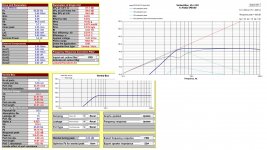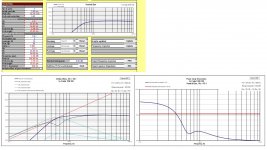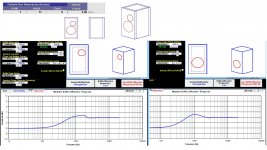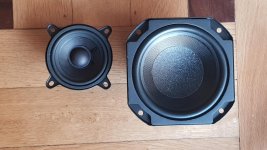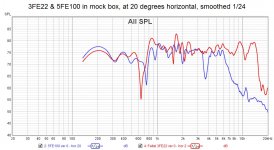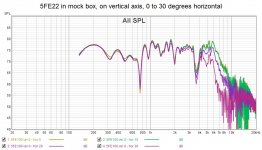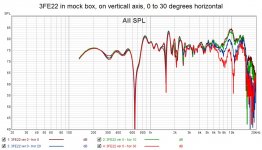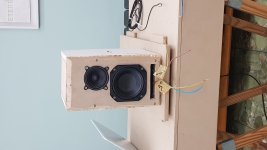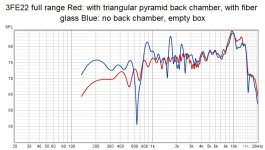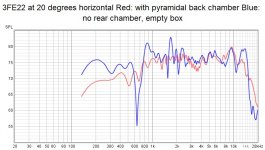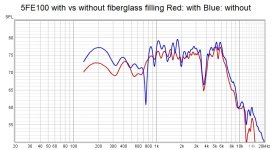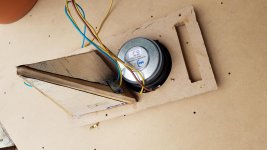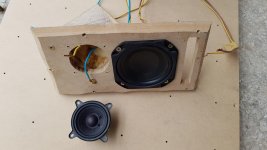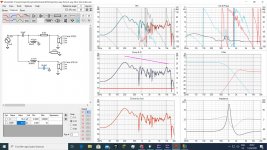My 16-year old asked me for desktop speakers for his rooms. He's starting to learn about electronics, so a wonderful opportunity to engage with him and build something. He's also into playing guitar and music...so you can appreciate where I'm coming from 😉
I'm thinking a vented passive two-way. He would be about two feet from each speaker.
The 3FE22 would allow me to do without a tweeter (and rolls off above 15kHz...), and couple with a 5 or 6" woofer. He prefers 5" to keep it smaller, and 5FE120 looks good I think. 6FE100 looks better, but it's 6". Would the listening distance be too close for these drivers to integrate well?
These drivers seem good for the passive xo design. I have very limited knowledge on passive crossovers, so easy is good. xo around 700 to 1000Hz, maybe. 1st or 2nd order, maybe?
FWIW, he will be playing music off his laptop into an assemble-yourself class-D low cost amp, so I'm not shooting for award winning audio quality. Yet would like to achieve the best I can at this level of complexity and price range.
Thoughts?
I'm thinking a vented passive two-way. He would be about two feet from each speaker.
The 3FE22 would allow me to do without a tweeter (and rolls off above 15kHz...), and couple with a 5 or 6" woofer. He prefers 5" to keep it smaller, and 5FE120 looks good I think. 6FE100 looks better, but it's 6". Would the listening distance be too close for these drivers to integrate well?
These drivers seem good for the passive xo design. I have very limited knowledge on passive crossovers, so easy is good. xo around 700 to 1000Hz, maybe. 1st or 2nd order, maybe?
FWIW, he will be playing music off his laptop into an assemble-yourself class-D low cost amp, so I'm not shooting for award winning audio quality. Yet would like to achieve the best I can at this level of complexity and price range.
Thoughts?
I think those are the perfect choice for this application. I like the 3FE22 a lot.
I would do 2nd order. Maybe even overlapped a bit for semi-linear phase. Say a 500hz highpass on the tweeter and 750hz lowpass on the woofer. You can use a global eq on the laptop to get a nice flat response or a little bass and top octave boost for a "fun" sound. Equalizer APO seems popular these days.
I think it'll exceed expectations once dialed in.
I would do 2nd order. Maybe even overlapped a bit for semi-linear phase. Say a 500hz highpass on the tweeter and 750hz lowpass on the woofer. You can use a global eq on the laptop to get a nice flat response or a little bass and top octave boost for a "fun" sound. Equalizer APO seems popular these days.
I think it'll exceed expectations once dialed in.
Last edited:
I wouldn't call it a tweeter. It's a midwoofer. I doubt that the bigger brother can acquire the status of woofer, too.
The diameter of the source, the diaphgram, must be proportional to the wavelenghts to be reproduced.
The diameter of the source, the diaphgram, must be proportional to the wavelenghts to be reproduced.
Why not buy a kit from Meniscus, or use cheap design by Troels, Zaph etc?
Yeap. Looked into it, especially Zaph SR71, but I would need to manage the import which is not something I want to engage in now.
You should study "Simple Loudspeaker Design" by Dave Dal Farra and then proceed with your son with simulating. That will give you the quality time to spend together.
You should study "Simple Loudspeaker Design" by Dave Dal Farra and then proceed with your son with simulating. That will give you the quality time to spend together.
Thanks for the tip! In fact that guide is basically what I learned to do. I'm learning to use VituixCAD now, so both sets of tools are likely to be used.
I never built a near-field nor passive xo speaker. So was wondering about driver integration at such a short listening distance from the speaker with drivers this size. The small Audioengine speakers I use on my desk have significantly smaller drivers, so made me wonder. But comments so far haven't raised that as a concern, so I will proceed with the analysis.
While the 6FE100 reaches lower, per UniBox, it does require a 40 liter box vs 9 liters for the 5FE100 so I'll go with the latter given smaller size is better for a teenager's desktop.
Attached the UniBox simulation for 5FE100, using Faital's published parameters. Anything wrong that jumps at you?
I think F3 at 59Hz is ok for a small 2-way.
Even though the driver is spec'd to handle 80W, UniBox shows that in a vented enclosure Xmax would be surpassed if more than 5W were applied. So 94dB SPL would be the max volume, which is plenty for a small room and near-field listening.
Feedback?
Next, box dimensions (per Dave Dal Farra).
PS: I haven't figured out how to post in-line images here. Any tips for that?
Attachments
I think those are the perfect choice for this application. I like the 3FE22 a lot.
I would do 2nd order. Maybe even overlapped a bit for semi-linear phase. Say a 500hz highpass on the tweeter and 750hz lowpass on the woofer. You can use a global eq on the laptop to get a nice flat response or a little bass and top octave boost for a "fun" sound. Equalizer APO seems popular these days.
I think it'll exceed expectations once dialed in.
Thanks for the input!!!
Do you happen to have measurements of the 3FE22? TS actual parameters/frequency/impedance? Or know where I can find some?
Did you use it with a tweeter on top or covering all the way up?
What are your thoughts regarding mounting: on the outside of the front baffle, or "behind" the front baffle with rounding of the cutout hole?
The one I have matched up well with website in all parameters. There are also measurements somewhere in the full-range forum.
All the way up. Definitely no need for a tweeter.
Whichever looks more pleasing to you! Won't make a big difference sonically as long as the baffle isn't too thick.
All the way up. Definitely no need for a tweeter.
Whichever looks more pleasing to you! Won't make a big difference sonically as long as the baffle isn't too thick.
Had to scale back on box volume from 9 to 5 liters due to desk space constraints. Nevertheless UniBox shows a smaller drop in low end output that I was expecting, which is great. Pushing further below 5 liter does loose proportionally more. Still considering if dropping volume further to 3 liters and let go F3 going to 79Hz vs 70Hz at 5 liters. And a sub xo below 80Hz 🙂
Did the BoxyCAD run, allowing for 6 liter instead of 5 because I envision using a separate chamber for the 3FE22. Thinking the dagger-style enclosure shown by xrk before. Guesstimated 1 liter for it.
Also attached the Bagby Baffle Edge Simulations for the woofer and tweeter.
Next up, SPL Trace to capture manufacturer's frequency response. I went ahead and purchased the drivers, so next week should be able to measure myself.
Did the BoxyCAD run, allowing for 6 liter instead of 5 because I envision using a separate chamber for the 3FE22. Thinking the dagger-style enclosure shown by xrk before. Guesstimated 1 liter for it.
Also attached the Bagby Baffle Edge Simulations for the woofer and tweeter.
Next up, SPL Trace to capture manufacturer's frequency response. I went ahead and purchased the drivers, so next week should be able to measure myself.
Attachments
Last edited:
You should study "Simple Loudspeaker Design" by Dave Dal Farra and then proceed with your son with simulating. That will give you the quality time to spend together.
This progressed ok until I got to the preparing the combined SPL response from the woofer from the manufacturer's curve using SPL Trace (from VituixCAD) and the SPL per the Bagby Baffle Edge Simulation. Apparently the SPL Viewer is no longer available.
So it seems the way to go is to build an experimental box with the dimensions and locations from the Baffle Edge Simulator, take actual measurements, bring all of that into VituixCAD, and design a crossover.
Am I on the right track?
Sure, once you measure drivers in the cabinet far field, then you need only crossover simulator to find passive parts values that suit your case. What baffle does is already in the measurements.
Have you considered just using the 3fe22
? For near field desktop they are great. I have them in the small ikea bamboo boxes...guessing about 3.5litres. I ported them and they sound fantastic as desktop speakers. I used equaliser apo in Windows to boost the LF a little.
? For near field desktop they are great. I have them in the small ikea bamboo boxes...guessing about 3.5litres. I ported them and they sound fantastic as desktop speakers. I used equaliser apo in Windows to boost the LF a little.
Have you considered just using the 3fe22
? For near field desktop they are great. I have them in the small ikea bamboo boxes...guessing about 3.5litres. I ported them and they sound fantastic as desktop speakers. I used equaliser apo in Windows to boost the LF a little.
I had not considered that. But makes me think how to lay out the xo to the 5FE100. Maybe run the 3FE22 full range and add the 5" to the bottom up to 300Hz or so?
Received the drivers, so excited to start trying stuff. 🙂
Attachments
Following on Jimk04 idea. Is this xo conceptually correct? Playing with VituixCAD, using Faital's published frequency responses.
Seems too simple to be this good. The 3FE22 10kHz peak would likely be mitigated with off-axis listening. Hoping to be able to throw a dummy box together this weekend and make measurements as starting point.
I have no experience with passive xo, so feedback super welcomed!
Seems too simple to be this good. The 3FE22 10kHz peak would likely be mitigated with off-axis listening. Hoping to be able to throw a dummy box together this weekend and make measurements as starting point.
I have no experience with passive xo, so feedback super welcomed!
Attachments
I assembled a very rough first box from spare wood I had around and made some measurements.
Box
I modelled 5FE100 in UniBox in a vented box, that showed a 5 liter box with 23.8cm2 port area and 21cm port length should provide an F3 of 70Hz with heavy fill.
The current box has 7.5 liters as it yet has no separate chamber for the 3FE22, and has no filling, and the port is rectangular and has 24cm2 port area.
Box has 1" chamfer around.
Measurements
The box was placed at 1m from floor, 2.5m away from closest wall and 1.5m from ceiling, and heavy pannels placed at the reflection point between box and mic on the floor.
Mic was at 70cm from box, which is the expected listening distance too.
REW windowing was set at 3ms left and 7.5ms right to have it accound lower in frequency. Still not graphing below 130Hz...how should I tackle that?
Attached the measurements for 5FE100 alone at different angles, 3FE22 alone at different angles both unsmoothed at 1/48, and a combination at 20 degrees horizontal and smoothed 1/12 to make it easier to compare.
Some observations:
Ideas, feedback?
Box
I modelled 5FE100 in UniBox in a vented box, that showed a 5 liter box with 23.8cm2 port area and 21cm port length should provide an F3 of 70Hz with heavy fill.
The current box has 7.5 liters as it yet has no separate chamber for the 3FE22, and has no filling, and the port is rectangular and has 24cm2 port area.
Box has 1" chamfer around.
Measurements
The box was placed at 1m from floor, 2.5m away from closest wall and 1.5m from ceiling, and heavy pannels placed at the reflection point between box and mic on the floor.
Mic was at 70cm from box, which is the expected listening distance too.
REW windowing was set at 3ms left and 7.5ms right to have it accound lower in frequency. Still not graphing below 130Hz...how should I tackle that?
Attached the measurements for 5FE100 alone at different angles, 3FE22 alone at different angles both unsmoothed at 1/48, and a combination at 20 degrees horizontal and smoothed 1/12 to make it easier to compare.
Some observations:
- 5FE100 doesn't seem to be doing much in the low end compared to 3FE22 which suggest maybe just using the 3" will make a simpler solution. However the 3" has rising response so maybe the xo helps tailoring the response. Feedback?
- The big dip at 650Hz on the 3FE22. 650Hz has 1/4 wave of 13cm, which is the internal box width. And there is no filling in the box. a separate chamber for 3FE22 plus filling hopefully addresses this.
- 3FE22 looks ok at 20 degrees up to 14.5kHz, where it falls off a cliff and might be a little to hot past 8kHz. Listening will tell.
- The dip at 740Hz on the 5FE100 has a 3/4 wavelength around the internal height of the box. Hopefully filling plus the chamber for the 3" addresses this.
Ideas, feedback?
Attachments
Last edited:
I built a triangular pyramidal back chamber for the 3FE22, filled it with fiberglass, and it significantly improved the response.
Also filled the box with fiberglass for the 5FE100, and while it did kill the big dip, it also took away 4dB in the bass, so more work required.
Also filled the box with fiberglass for the 5FE100, and while it did kill the big dip, it also took away 4dB in the bass, so more work required.
Attachments
Last edited:
Good progress Lewinski. The 3fe22 has a rising response towards the HF and indeed your FR graphs show this. This may or may not matter depending on listening axis. If on axis at near field and young son's ears maybe too bright so may need padding down.
I have modelled the 5FE before as it was a driver that interested me but I can't recall the box volume. I shall have a look. Maybe the small enclosure for the 3fe22 is robbing the 5Fe100 of some useful volume.
I wouldn't maybe get too hung up on the measurements for now.....have a listen and see what you think.!
I have modelled the 5FE before as it was a driver that interested me but I can't recall the box volume. I shall have a look. Maybe the small enclosure for the 3fe22 is robbing the 5Fe100 of some useful volume.
I wouldn't maybe get too hung up on the measurements for now.....have a listen and see what you think.!
Good progress Lewinski. The 3fe22 has a rising response towards the HF and indeed your FR graphs show this. This may or may not matter depending on listening axis. If on axis at near field and young son's ears maybe too bright so may need padding down.
I have modelled the 5FE before as it was a driver that interested me but I can't recall the box volume. I shall have a look. Maybe the small enclosure for the 3fe22 is robbing the 5Fe100 of some useful volume.
I wouldn't maybe get too hung up on the measurements for now.....have a listen and see what you think.!
Indeed, I'm thinking 20 degrees off-axis as well.
Threw together a 2nd order xo. Feedback?
Apparently these sizes of inductors are difficult to find around here so might need to wind my own 😱...oh well!
Attachments
You seem to have attenuated the 3fe22 by 10db if I read the curves correctly. You can bring that back up by tuning the resistors which im sure you know.
Have you altered the values if the coils to the nearest readily available one and see if it makes much difference? You might get away with it.
Have you altered the values if the coils to the nearest readily available one and see if it makes much difference? You might get away with it.
- Home
- Loudspeakers
- Multi-Way
- Near field 2-way for my son: Faital 3FE22 & 5FE120?
